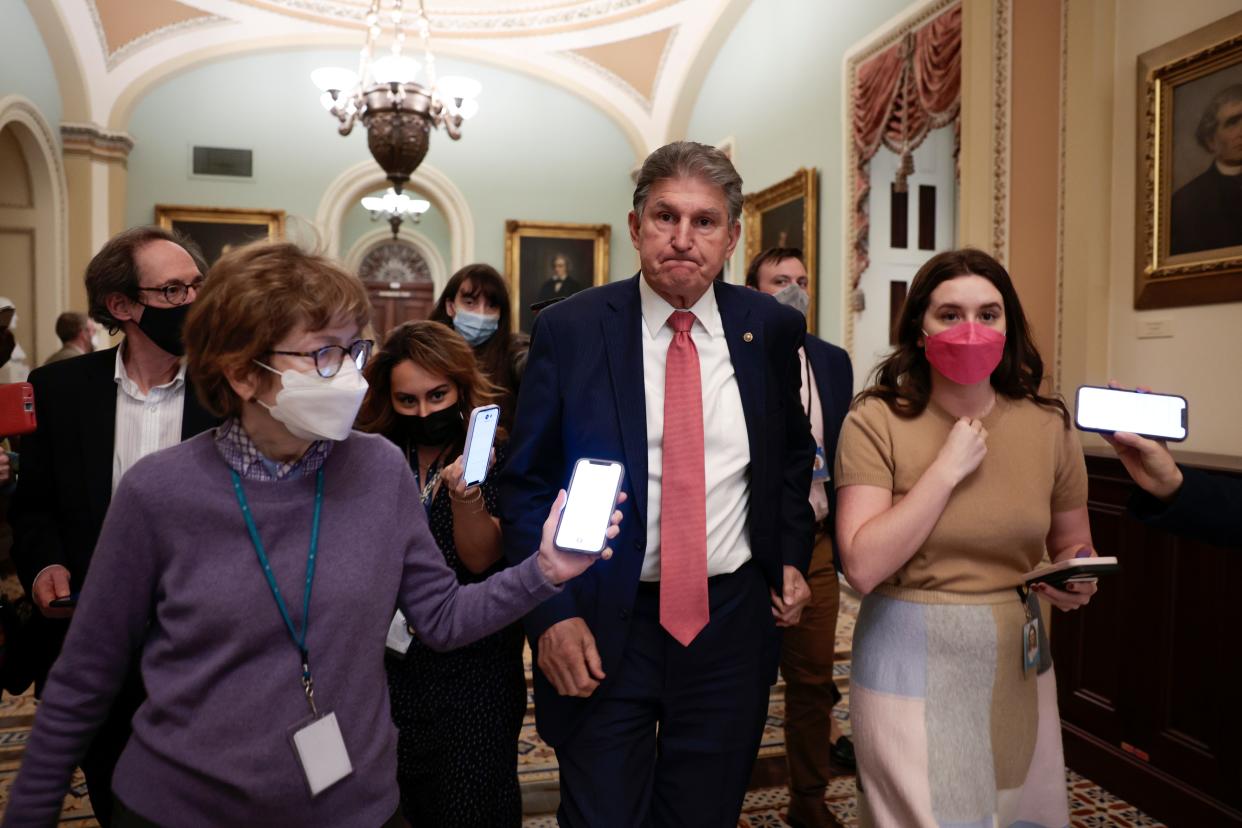What does Manchin's decision on Build Back Better Act mean for Georgia residents?

- Oops!Something went wrong.Please try again later.
- Oops!Something went wrong.Please try again later.
With the Democrats' signature social and environmental policy bill, Build Back Better Act, on pause, a number of social and environmental projects in Georgia hang in the balance. The passage or failure of the bill will impact Medicaid expansion, funding for coastal rehabilitation, the child tax credit, solar manufacturing incentives, housing and more.
More: Sen. Joe Manchin says he won't support Biden's Build Back Better social spending bill
On Sunday, West Virginia Sen. Joe Manchin said he could not vote for the Build Back Better Act. Manchin is the key vote on the bill – with a 50-50 Senate Democrats need every vote to pass the legislation – so the future of the bill is now in question.
This is what you need to know.
What Build Back Better means for Georgia
The 2,000-page bill is sweeping, in part because, as a budgetary bill, it can circumvent the two-thirds majority needed in the Senate to break a filibuster and pass with a simple majority – if every one of the 50 Democrats vote for it. Democrats have put all their priorities in the bill in the hopes of squeezing it past while avoiding a Republican filibuster.
More: What is the Build Back Better Act, and what's in it for Georgia?
Among the proposals:
Extend the child tax credit, which provides $300 monthly to families for every child under 6 and $250 for every child between 6 and 17.
Create a federal alternative in states like Georgia that have not expanded Medicaid, allowing people who make up to 128% of the federal poverty line to buy a Medicaid-like plan with no premium through the health care exchange and expanding insurance to 548,000 uninsured Georgians.
Expand Section 8 housing choice vouchers by about 10,000, which allow low income individuals to pay just 30% of their income on rent in privately owned apartments.
Provide free preschool for children who are three and four, allowing an additional 183,000 Georgia children to attend preschool per year.
Guarantee that families making up to 2.5 times Georgia's median income will pay no more than 7% of their income for child care, covering about 630,000 children in the state.
Other proposals include expansions of free school lunches, addressing climate change, including a proposal pushed by Sen. Jon Ossoff for subsidies on solar manufacturing, and expanding care for senior citizens and those with disabilities. Sen. Raphael Warnock's office highlighted his work on the Medicaid expansion and the Child Tax Credit, but also policies to provide debt relief for small farmers.
Who opposes it
House Republicans in Georgia have voiced strong objections to the Build Back Better Act, when the bill passed the house on Nov. 19 it was almost entirely a party line vote, with all but one Democrat voting for it and every Republican voting against.
The Build Back Better Act includes both expenditures and revenue-raising measures; a Congressional Budget Office report found over the course of 10 years the bill would add $367 billion to the deficit. For comparison, this 10-year number is about 11 percent of the one-year federal deficit for 2020 of $3.2 trillion.
Because of the deficit and other provisions, Rep. Rick Allen, R-Augusta, released a statement in November condemning the bill. He opposed expanded IRS authorities and small business and corporate tax hikes meant to pay for the bill, as well as a tax on natural gas. He opposed some of the proposals as well, saying the bill would threaten small, private child care providers, provide tax credits for green technology favored by the wealthy such as electric cars, and the repeal of the Hyde amendment, which prevents government funds from being used on abortions.
"The so-called ‘Build Back Better Act’ will destroy our economy as we know it," Allen was quoted as saying in the press release. "If you think rising prices at the gas pump and empty shelves in the grocery store are bad now, you better hope the Senate stops this bill in its tracks."
What happens next
Despite Manchin's comments, Senate majority leader Chuck Schumer, D-NY, said in a "dear colleague" letter that he plan to move forward with a vote on the Build Back Better Act. In it, Schumer called out Manchin by name and expressed his disappointment.
"The American people also decry this deadlock," Schumer wrote. "I believe our constituents deserve to know which Senators choose to hide behind ill-conceived and abused rules... Therefore, as with the BBB, members will be given the chance to debate on the Senate floor and cast a vote so that their choice on this matter is clear and available for everyone to see."
In a statement to the Chronicle, Warnock said he is still planning to push forward on the bill.
"Too many hardworking Georgians are in need of the cost-cutting, job-creating investments we’re fighting," Warnock wrote in the statement. "I’m not done fighting for those investments, and I look forward to making the case to all my colleagues when we return to Washington next month about why we need to get these priorities done. Georgians can’t afford to wait.”
The Chronicle has reached out to other Georgia federal lawmakers and will include their comments as we receive them.
This article originally appeared on Augusta Chronicle: Georgia residents impacted by passage, failure of Build Back Better Act

